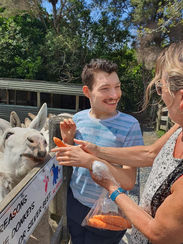THERAPIES
Current treatments for Angelman syndrome, focus on managing the symptoms and developmental delays. Early intervention and ongoing therapies are important for maximizing development and quality of life. Though it is best to start as early as possible, many new skills can still be learnt well into adulthood. A team of healthcare professionals, including doctors, therapists, and other specialists, should provide a comprehensive care plan.
Research is ongoing to develop new and more effective therapies for Angelman syndrome. For more clinical treatments and therapies, see Medical.

Pre-school Learning & Development Support
Children with Angelman Syndrome benefit greatly from selected therapy services and they continue to learn and improve throughout their lives. Early intervention support teams help tamariki (children) at home and in their early learning centres. These funded services are available from birth through to starting school. The 3 primary therapies you will receive are:
-
Speech & language therapy (with AAC)
-
Physiotherapy
-
Occupational therapy
In addition to these, children with AS can also benefit from private therapies such as hippotherapy, hydro/aquatic therapy, music therapy, art therapy, sensory therapy and pet therapy – depending on each individual’s preferences and inclinations.
At times there might also be a need for interventions for challenging behaviours: challenging behaviours for people with AS.
In addition to the 3 primary therapies, people with Angelman syndrome can also benefit greatly from alternative therapies such as hippotherapy, hydro/aquatic therapy, music therapy, art therapy and pet therapy – depending on each individual’s preferences and inclinations.














